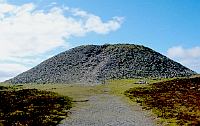Second in an occasional series on the poetry of Louis MacNeice
The most powerful poems by Louis MacNeice were written in the runup to the Second World War. Literary works from that time generally fall into one of two categories: lighthearted escapist entertainment (e.g. P.G. Wodehouse), or works full of somber foreboding.
MacNeice’s poems from the late thirties fall into the latter category. “Autumn Journal”, written during the “Phony War” in late 1939, is probably the best exemplar of these twilight-of-peace poems.
 MacNeice was born and raised in Belfast before the Irish Republic attained independence, and later went to University and pursued his career in England. But his poetry often returned to Ireland. In the following poem he contemplated Irish neutrality in the conflagration that was to come.
MacNeice was born and raised in Belfast before the Irish Republic attained independence, and later went to University and pursued his career in England. But his poetry often returned to Ireland. In the following poem he contemplated Irish neutrality in the conflagration that was to come.Neutrality
By Louis MacNeice
The neutral island facing the Atlantic,
The neutral island in the heart of man,
Are bitterly soft reminders of the beginnings
That ended before the end began.
Look into your heart, you will find a county Sligo,
A Knocknarea with for navel a cairn of stones,
You find the shadow and sheen of a moleskin mountain
And a litter of chronicles and bones.
Look into your heart, you will find fermenting rivers,
Intricacies of gloom and glint,
You will find such ducats of dream and great
doubloons of ceremony
As nobody to-day would mint.
But then look eastward from your heart, there bulks
A continent, close, dark, as archetypal sin,
While to the west off your own shores the mackerel
Are fat – on the flesh of your kin.
So here we see Ireland, squeezed between the darkness of a continent on the verge of war in the east, and the unforgiving ocean to the west. I like to think of the mackerel to the west as a representation of America, which had been greedily consuming the children of Ireland decade after decade for the previous century. Just think of all the “New York wakes” thrown after the departure of the emigrants by those left behind.
But Ireland’s neutrality during World War II was not uniform. On the one hand, various factions aided and abetted the Nazis, out of hatred for the Sassenach. On the other hand, Irish youth who longed for glory crossed the Irish Sea and joined the RAF.
From our vantage point more than sixty years later, we can see that 1939 was indeed the year “the end began,” at least for Europe.

4 comments:
On the other hand, Irish youth who longed for glory crossed the Irish sea and joined the RAF.
Ah, yes. My young Irish uncle lied about his age and found himself in the RAF in Burma at the age of 15.
I wish I had been smart enough to ask him about "his" war. But he died suddenly at 52, so his story went to the grave with him.
It makes me think that if everyone was a storyteller, all their narratives might be a balm for something...
No, the end did not begin in 1939, but on 28 June 1914, when Mr. Princip murdered Archduke Franz Ferdinand, and brought down Armageddon.
Herr Hitler and his war of 1939 only continued what Princip unleashed. Christian Kingdoms were overturned; faith in progress and science were destroyed; murderous crackpots like the Communists and Nazis were liberated from the doss houses and bars they frequented and the false and destructive doctrine of Socialism given a real push forward. Even today, the problems we have with Islam mostly stem from that war.
I suppose some will argue that war brought good to some people (most Irish today probably think so). I beg leave to doubt it. If I could waive a wand and stop the bullet that killed the Archduke and his poor wife, I surely would.
Well, Jefe, if you're going to go all pedantic-like on me, we could certainly assign some other dates as "the beginning of the end."
Working backwards in time:
1871, Paris Commune
1866, unification of Germany
1789, French revolution (my personal favorite for the award)
1517, Martin Luther's theses & the beginning of the Reformation
1066, the Norman Invasion
793, sack of Lindisfarne by the Vikings
I could go on, but you get the idea. Things just continue to deteriorate.
Didn't mean to go pedantic...but I take your point. I would definitely put the communards in the "bad" column, along with the French revolutionaries (although I confess a weakness for Napoleon, who I have never grouped with the revolutionaries).
But I take your point. I guess entropy sucks.
P.S. The Fall of Rome was a Bad Thing also.
Post a Comment
All comments are subject to pre-approval by blog admins.
Gates of Vienna's rules about comments require that they be civil, temperate, on-topic, and show decorum. For more information, click here.
Users are asked to limit each comment to about 500 words. If you need to say more, leave a link to your own blog.
Also: long or off-topic comments may be posted on news feed threads.
To add a link in a comment, use this format:
<a href="http://mywebsite.com">My Title</a>
Please do not paste long URLs!
Note: Only a member of this blog may post a comment.